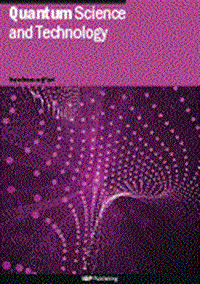近优量子核主成分分析
IF 5.6
2区 物理与天体物理
Q1 PHYSICS, MULTIDISCIPLINARY
引用次数: 0
摘要
核主成分分析(kernel PCA)是一种非线性降维技术,它利用核函数将数据映射到高维特征空间,从而将线性 PCA 的适用性扩展到非线性数据,并促进信息主成分的提取。然而,核 PCA 需要处理大规模矩阵,导致计算复杂度高,为在大数据环境中高效实施带来了挑战。最近,量子计算与机器学习中的内核方法相结合,能够在难以处理的特征空间内对输入数据进行有效分析。虽然现有的量子内核 PCA 提议有望实现指数级的速度提升,但它们对量子硬件提出了严格的要求,要满足这些要求具有挑战性。在这项工作中,我们通过建立量子核方法与块编码之间的联系,提出了核 PCA 的量子算法,从而在量子计算机上对集中核矩阵进行对角。查询复杂度与数据向量 D 的大小成对数关系,与数据集的大小成线性关系。当数据集由几个高维向量组成时,可以实现指数级提速,此时数据集的大小为多项式,而 D 则非常大。与现有研究相比,我们的算法提高了量子核 PCA 的效率,降低了对量子硬件的要求。此外,我们还证明了基于块编码的算法符合查询复杂度的下限,表明我们的算法接近最优。我们的研究为开发量子机器学习算法铺平了新的道路,旨在解决现实世界中的实际问题,并展示机器学习中的量子优势。本文章由计算机程序翻译,如有差异,请以英文原文为准。
Near-optimal quantum kernel principal component analysis
Kernel principal component analysis (kernel PCA) is a nonlinear dimensionality reduction technique that employs kernel functions to map data into a high-dimensional feature space, thereby extending the applicability of linear PCA to nonlinear data and facilitating the extraction of informative principal components. However, kernel PCA necessitates the manipulation of large-scale matrices, leading to high computational complexity and posing challenges for efficient implementation in big data environments. Quantum computing has recently been integrated with kernel methods in machine learning, enabling effective analysis of input data within intractable feature spaces. Although existing quantum kernel PCA proposals promise exponential speedups, they impose stringent requirements on quantum hardware that are challenging to fulfill. In this work, we propose a quantum algorithm for kernel PCA by establishing a connection between quantum kernel methods and block encoding, thereby diagonalizing the centralized kernel matrix on a quantum computer. The query complexity is logarithmic with respect to the size of the data vector, D, and linear with respect to the size of the dataset. An exponential speedup could be achieved when the dataset consists of a few high-dimensional vectors, wherein the dataset size is polynomial in , with D being significantly large. In contrast to existing work, our algorithm enhances the efficiency of quantum kernel PCA and reduces the requirements for quantum hardware. Furthermore, we have also demonstrated that the algorithm based on block encoding matches the lower bound of query complexity, indicating that our algorithm is nearly optimal. Our research has laid down new pathways for developing quantum machine learning algorithms aimed at addressing tangible real-world problems and demonstrating quantum advantages within machine learning.
求助全文
通过发布文献求助,成功后即可免费获取论文全文。
去求助
来源期刊

Quantum Science and Technology
Materials Science-Materials Science (miscellaneous)
CiteScore
11.20
自引率
3.00%
发文量
133
期刊介绍:
Driven by advances in technology and experimental capability, the last decade has seen the emergence of quantum technology: a new praxis for controlling the quantum world. It is now possible to engineer complex, multi-component systems that merge the once distinct fields of quantum optics and condensed matter physics.
Quantum Science and Technology is a new multidisciplinary, electronic-only journal, devoted to publishing research of the highest quality and impact covering theoretical and experimental advances in the fundamental science and application of all quantum-enabled technologies.
 求助内容:
求助内容: 应助结果提醒方式:
应助结果提醒方式:


